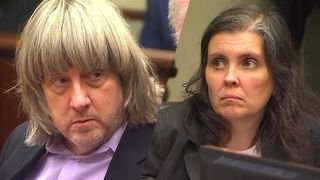
Psychiatry
Frightening Episodes of Child Abuse
Psychiatric Reflections on the Torture Parents and the Pedophile Olympic Doctor
Posted February 6, 2018

I was thinking about the torture parents, David and Louise Turpin and their thirteen children, and Larry Nassar, the pedophile doctor who preyed on hundreds of innocent girls. As a psychiatrist I have heard many horrific stories of child abuse from my patients, each one worse than the last. When I think I have reached the very bottom, a new story, a more depraved one comes to light. I have seen the consequence of the damage done to these innocent children from sexual abuse, physical abuse, emotional abuse, and emotional deprivation. Recovery requires years of psychotherapy, and even so traumatic experience always leaves scars. I know as a therapist first hand, the depth of pain, self-hate, shame, damaged esteem, and self worth of my patients. I know the hard work it takes to find one’s way to worth and love. I know the difficulty to re-establish a loving trust where one dares to be emotionally open one again.
Raising our children well is of the utmost importance for us all, and for the well being of our society. We want our children to grow up to be loving responsible, self reliant, and to raise their own children well. Child rearing is a wonderful, trying, and difficult loving commitment. The basic principles of child rearing are boundaries and love. No one can be perfect; we just have to be good enough. This holds true all the way from infancy to adulthood. Love and respect begets love and respect. When sufficient love is not available, and abuse is, people fill the emptiness and attach by virtue of sadomasochistic relating. This is infused in the limbic mapping of emotional experience. It is the source of all psychiatric symptoms. Likewise, it is the substitute foundation that creates human evil.
I don’t know the story of the formative lives of Larry Nassar, and David and Louise Turpin. I don’t know the subsequent traumas they were subject to. But I do know that their characters were founded in sadomasochism. They are the extremes of moral monsters. The harm they have done to children is unconscionable. They have passed it on to these children – The sins of the father…
But what about the rest of us who are not monsters. We all need to look to ourselves to provide the best loving environment for our children. It’s a tall order. Under the best of circumstances, a loving couple looking out for their children is extremely difficult. We have so many broken families, so many unhappy marriages, so many divorces, so many single parents, step parents, children having children, death of a parent, etc. It’s a difficult world out there.
In my view, adolescents need their parents more than ever. We need to deal with them, protect them, oversee them, yes, fight and disagree with them. It all comes with the package. (see – “Who’s Responsible for Your Teenager’s Behavior? Good Enough Boundaries and Love are the Most Important Guides”). Why is this the most important (and difficult) time for parents? A teenager needs to try out experience for himself. He needs to go out in the world on his own. When he goes too far and loses his way, he needs to come back to the security of his home, regroup with the loving arms of his parents, and go back out there again. This is when boundaries are most important. Any child worth his salt needs to rebel. He needs firm and fair limits to push against. He needs to reject the mores of his childhood and discover the ways of the world for himself. He needs to test the temptations of life – sex, drugs, and rock and roll. When he inevitably goes too far and puts himself in jeopardy, he relies on two things to right the ship. On the inside, with the authentic-being of a well enough raised child, he says to himself, “What are you doing? You need to stop being so reckless.” And on the outside he needs his parents’ love and limits. The last thing to myelinate in an adolescent brain are his frontal lobes, the seat of judgment. Before this happens he lacks judgment. It is through these experiences, as myelination takes place, that he learns adult judgment.
Parents should be very cautious to entrust their children to any institution – private boarding schools, ballet schools, Olympic training facilities away from home – for gymnasts, swimmers, skaters, etc.; and the like. Parents who aspire to the Olympics for their children need to be extra careful. I am certainly not blaming them for the monster Larry Nassar. We are all best off raising our adolescents subject to our oversight, rather than entrusting them to others. Many times the special aspirations may well originate in the parents, not the child. I have seen the real consequences of so many of these situations away from home in the service of special goals, or the promise of a great education. It’s not so pretty. No one will love and protect their kids from exploitation like a parent. They need us to be there. The whole person needs to develop in a balanced way, not just one skill: social relations, sexual experimentation, intellectual learning, athletics, music, etc.
Finally, we need to address the responsibility of the helping professions. Psychiatry has lost its way, and has become a distribution center for psychiatric drugs. It needs to face that psychiatric problems and symptoms are human problems, no more and no less, derived from the formation of our characters, as we adapt to our emotional environment. Real psychotherapy addresses what ails us, not psychiatric drugs. Again, I am not calling for a return back to old failed theories of psychotherapy. Instead, we need to look ahead to a new understanding of the psychotherapy of character, which addresses the art and the science of psychotherapy, and encompasses a responsiveness to the human spirit, and is consonant with a biological understanding of the brain.

